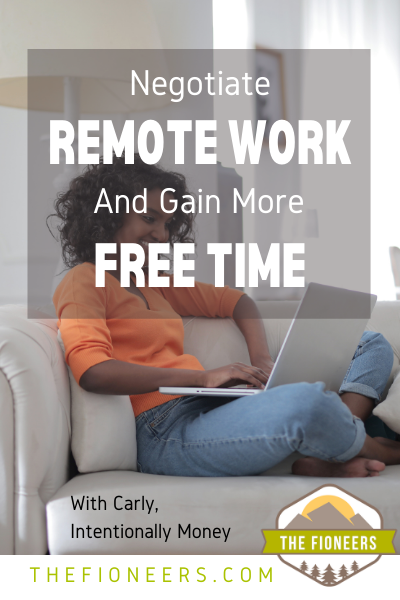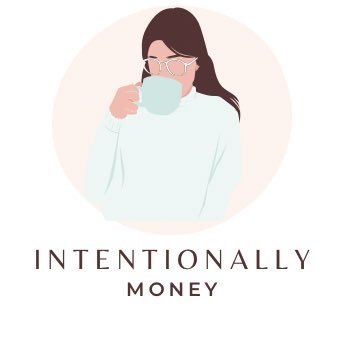
I’m excited to share this interview with Carly because it’s especially timely. At least here in the United States, companies are figuring out their long-term (post-COVID) work-from-home policies.
I recently put out a request for Slow FI stories, and I was excited to hear from Carly! I particularly wanted to hear from:
- Non-bloggers (you all hear from us enough already…), and
- Newer bloggers (who we might not yet know about).
She started her blog, Intentionally Money, in early 2021 focusing on her “love of personal finance and the influential role it plays in designing your ideal life.” I certainly love this motivation.
I’m also excited to hear about the recent changes she’s made in her life. After realizing that she had built financial freedom (became debt-free, built an F-You Money Fund, and reached Coast FI), she was ready to take some big steps to improve her life.
One of those steps was to negotiate an almost fully remote work arrangement. She now gets to work from home five out of every six weeks!
If you are in a situation where you are being asked to return to the office more than you’d like, I hope this interview can encourage you to explore your options.
Let’s get into the interview.
1. Tell me a little bit about you.
My name is Carly, and I am married and have two kids under three. I work as a pharmacist and have lived in the midwest my entire life.

While I mostly enjoy my job, it isn’t what brings me joy in my life. I love to spend time outdoors and at our family farm. I started a blog, Intentionally Money, this year and have been surprised by how much I have enjoyed writing.
I became passionate about personal finance after pharmacy school and purchasing a new car. In 2014, I signed up for Mint.com and found myself with $140k worth of debt. I felt like I was suffocating, so I decided to pay off my debt as quickly as possible.
Fast forward a few years, I moved in with my now-husband, got married, and was pregnant with my first child when I made my last payment towards my student loans. The entire process took me four years. It was only possible by decreasing my living expenses.
Returning to work after my first maternity leave was very challenging. I was suffering from postpartum depression. On top of that, I was returning to a toxic work environment with toxic colleagues.
If I had the means to quit at that point, I would have. But, I couldn’t. I did have an emergency fund. But, I didn’t have any other investments outside of retirement accounts that I could have used to support my family.
Again, I felt trapped.
This is when I took a deep dive into personal finance and found the Financial Independence and FIRE movement. I promised myself that I would never again be in an unhealthy work environment without the means to leave.
2. Tell us about your recent changes at work. Why did you decide to make these changes?
When the COVID shutdowns started in 2020, I was pregnant with my second child. This provided me with the opportunity to work entirely remotely. I took this opportunity to show that I could be even more productive working from home than in the office. I focused on continually exceeding expectations set by my boss so that I could demonstrate this.
During the summer of 2020, I went on my second maternity leave. During my leave, I had time to examine my life and what I wanted. I ran the numbers and realized that I was already Coast FI and that I had F-You Money (above and beyond what I had in my emergency fund previously).
Realizing this gave me the courage that I needed to ask my boss for what I really wanted so I could build a more intentional life.
When I had four weeks left of my maternity leave, I emailed my boss. I requested the following:
- The ability to continue working from home 100% of the time
- To work 32 hours/week
- More meaningful work
- A raise!
I was very direct in my email, and I told him to let me know how we could make those requests happen.
A week later, we set up a phone call to discuss my requests. This was the outcome:
- I was granted the opportunity to work from home for 5 out of every 6 weeks!
- He informed me that if I went below 36 hours that I’d lose my benefits. However, he would approve as many unpaid days off as I wanted. This allowed me to still stay “full-time” but take as much time off as I needed.
- He had plans to enlist me in an upcoming project that would be a lot more interesting.
The only thing he couldn’t get me was a raise since the company wasn’t providing raises because of the challenges related to the pandemic.
I was okay with this. Why? Because I calculated it, and my true hourly wage increased significantly.
A true hourly wage is when you take into account things like the time you spend commuting and the cost of vehicle maintenance for the drive and how it changes your wage.
Here is the formula to calculate your true hourly wage:
True Hourly Wage = (Total Wages – Total Costs Associated with working)/(Total Hours spent working + Hours spent commuting/preparing for work, etc.)
While my overall pay went down slightly (due to working less) when I made this shift, my true hourly wage went up by $7.66/hour. This only takes into account the reduced transportation costs and reduced time spent commuting. This doesn’t even include extra costs of food and work clothing I would have from working in an office full-time.
3. How has the shift to working remotely (and fewer hours) impacted your quality of life?
These shifts have had a considerable impact on my quality of life.
I am no longer stressed in the morning trying to get ready for work and trying to get two kids ready for daycare. Since I’m working from home, I clean on my breaks and fold laundry. I have even gone to Target and done grocery pick up over my lunch break. Sometimes, I even slip in midday workouts. These are all tasks that used to be accomplished at night or over the weekend. I feel like I have gained so much of my life back.
My work life has never been better. I have decreased interactions with coworkers that I would butt heads with and have the opportunity to focus on more meaningful work.
Being able to take unlimited (unpaid) time off has been excellent. I have taken days off to take my kids to the doctor, to work on my garden, and to work on my blog. Since negotiating this, I haven’t worked an entire pay period without having a day off.
4. How did the decision to work remotely impact your financial goals or timelines?
The changes have had little impact on my financial goals or timelines. Because of the change to my true hourly wage, I don’t even notice the change in income when I take unpaid days off.
The savings from working from home and no longer commuting more than make-up for any lost wages. This means that I am still able to contribute the same amount to my investments and savings goals.
Additionally, I have been able to use my free time to pick up some side hustle income. I have started to build a website and social media content for a new business start-up and have an opportunity to revamp an existing business’ website.
This has allowed me to utilize my creativity and has led to increased happiness. In the long term, I would love to take a step back from working full-time as a pharmacist to pursue more creative work.
5. What enabled you to negotiate remote work and unlimited time off?
Paying off my student loans and having F-You money enabled me to make the requests to change my work life. I would never have done that if I didn’t have the means to walk away from my job.
I was able to pay off my student loans in four years by doing a few things:
- Picking up extra shifts and working overtime.
- Decreasing my living expenses by moving from my own two-bed/two-bath apartment and moving in with my boyfriend (now husband).
I threw all of my extra income and savings toward my student loans which helped to decrease the timeline.
Building an F-You Money fund also helped a lot. I consider my F-You money to be the amount that would support my family’s current spending for 2-years, excluding my husband’s salary. Essentially, I’m taking into account the portion of expenses supported by my salary only, including a portion of our mortgage, groceries, utilities, and childcare. If my children were no longer to go to daycare during that time, the F-You money would cover 4 years of living expenses (instead of two).
I also had support from my husband to make this decision. My husband is constantly pushing me to do what makes me happy. He saw how miserable I was when my workplace was toxic and how negatively it impacted my mental health. He encouraged me to do whatever it took to become happier. He provided me with the moral support needed to send my boss the email about the changes I wanted to make.
On the financial side, he works full-time and his salary covers 33% of our monthly expenses. If we were to decide to reduce our contributions to his HSA and FSA, he could cover 50% of our monthly expenses. This helps to provide peace of mind, knowing that we’ve already reached Coast FI and have F-You money as well.
6. Is there anything that you’ve adapted in your life so that you can continue working toward your goals?
There hasn’t been anything that I needed to adapt to continue working towards my goals. All of the changes have aligned with my goals and my ideal life.
The only thing that I might tweak in the future is to decrease the amount of money I’m contributing to pretax accounts. I am currently contributing more to those accounts (401(k), Childcare FSA, and HSA) so that we can reduce our tax burden.
If we decrease the contribution to our pretax accounts, we could build up more money in savings and my brokerage accounts. This would provide us with a lot of flexibility in the future because we aren’t entirely sure what we want to do.
We may want to scale back at work even more. Or, we may decide we want to retire early. We’d love to travel more over the summer when our kids are older. We’ve also talked about the idea of living in different parts of the country over the summer if we are able to work remotely. Having money that easily accessible will help us achieve our future goals and dreams, whatever they may be.
7. Why and when do you think someone might consider “downshifting?”
If your career no longer feels fulfilling or meaningful, it may be time to downshift. I would also encourage anyone to examine your life when significant life changes occur to ensure that you live your values and maintain your integrity.
During both of my maternity leaves, I had the opportunity to examine my life and figure out what I wanted. After my first maternity leave, I was filled with anxiety about going back to a stressful job where I didn’t feel appreciated. So, I started to take the steps so that I could downshift in the future. During my second maternity leave, I realized that I could start using some of that freedom now.
8. How did your pursuit of FI help or hinder your decision to work remotely (and fewer hours)?
The pursuit of FI made it all possible. Without financial independence, I would not have known where I stood financially or what I would need to feel secure. I needed this knowledge to be able to downshift. Without FI, I would have been stuck in an unfulfilling career and trying to find meaning in my life. FI has given me the power that I need to make changes today to build my best life.
9. What advice do you have for someone considering a similar decision?
If you’ve already built up your F-You Money, I would encourage you to go for it! If you want to work remotely, work part-time, or want more money, ask for it.
Lay the groundwork for why you deserve those things ahead of time. Then, when you have a conversation with your boss or leadership team, it can hopefully be an easy one. You can give examples of how you will thrive with remote work and the financial impact you have had on your company’s bottom line.
The worst your boss or company can say is no. And if they do say no, you can examine if you want to stay in your current role or try to find a position at another company. There is so much power in simply knowing how valued by your company you are.
If you still need to build up financial security and F-You Money, as I did, I’d encourage you to figure out where you currently are and decide on your goals. First, I would establish an emergency fund. It’ll help you sleep at night! Second, I would tackle any high-interest debt. I felt like I was drowning when I had my student loans. It was amazing how I felt like I could finally breathe when they were paid off.
Once you’ve accomplished those two BIG tasks, I’d encourage you to examine your life and find out what brings you joy. If you can eliminate something that doesn’t make you happy and saves you money, do it! This will help you get an idea of how much money you actually need to support your ideal life. From there, you can build your F-You fund.
The feeling of knowing that you are supported financially regardless of your decisions is unparalleled.
Thank you so much, Carly, for sharing your story with us! I have so many takeaways from this interview!
First, I want to underscore what Carly shared about how building financial freedom can help us build the confidence to ask for what we want. I’ve definitely seen a similar trend in my life. As I’ve built more financial freedom, I’ve gained more confidence in setting boundaries and making requests that will make my life better.
The likelihood is that your job won’t be jeopardized by asking for what you want. But without having the financial freedom to back you up, it can be extremely challenging to ask (and you have very little recourse if they say no). By building up your financial freedom, you are balancing out the power in the employment relationship.
The second thing that struck me about this interview with Carly was the discussion about the true hourly wage. Even though Carly is technically losing some income (by taking unpaid time off), the true impact of this is very low. She’s spending a lot less time if you count both her reduced work hours and commute time. She’s also spending a lot less money on gas and car maintenance expenses.
When I started working less, I experienced something similar. I took a 50% pay cut to work 50% less, but my true hourly rate increased dramatically. My total time spent doing work-related things when down by more than 50% because my commute was shorter. Also, I saved money by taking public transportation instead of driving.
On top of this, we dramatically reduced our emotional spending. Within the first year of quitting my full-time job, we spent $1000-$1500 less each month on things that you could categorize as convenience or escape. This included:
- Restaurants – Particular take-out dinner because we’d be too tired to cook
- Groceries – Particularly pre-made or easy-to-make foods that were more expensive
- Travel – We didn’t need to travel hack or find the deals because we deserved this
- General Merchandise – Random purchases off of Amazon
It was amazing to realize that I could take a 50% pay cut and work 50% less, and it had zero impact on our financial independence timeline because we naturally spent less.
Finally, the last point I want to underscore is the importance of taking a step back to think about what you really want. Sometimes, a big life change can help you with this. For Carly, her most recent shifts were inspired by having a new baby and taking time off during maternity leave. I decided to make big changes when I had to take time off work in 2018 to manage my anxiety and panic attacks.
Big changes can prompt you to step back and think about what you want. But, you don’t need to wait for a big change! You can take a step back and do this anytime!
If you’d like to learn more about Carly’s journey, you can find her in the following places:

- Blog: https://intentionallymoney.com/
- Twitter: @intentmoneyblog
- Instagram: @intentionallymoney

























Wow, I was very surprised that the company granted under full time work for still full time pay. Impressive.
How long had you been with the company before getting to ask for those things? I really want to negotiate something very similar with my company as well but I just never got around to it.